- Home
- Wendell Berry
Fidelity
Fidelity Read online
Praise for Fidelity
“Berry richly evokes Port William’s farmlands and hamlets, and his characters are fiercely individual, yet mutually protective in everything they do . . . His sentences are exquisitely constructed, suggesting the cyclic rhythms of his agrarian world.”
—The New York Times Book Review
“Each of these elegant stories spans the twentieth century and reveals the profound interconnectedness of the farmers and their families to one another, to their past and to the landscape they inhabit.”
—SARAH POLLOCK, The San Francisco Chronicle
“Birth, life, death and the primary institutions of family and community are the axes on which the stories turn. Their plots are as slender as fence posts: a soldier walks home at war’s end; a young woman with a mild fever ponders her first years of marriage; a taciturn farmer takes his moribund father out of a hospital’s intensive care unit so the old man can die with dignity. But Berry invests them with intense feeling, using the plain language of a largely oral culture, building metaphors and similes that have the clear ring of folk wisdom. His ground’s-eye view of events can be chilling, as when he sums up World War II as a great tearing apart. If the stories seem somber in their emphasis on loss, the pains are clearly leavened by the comforts of community and connectedness that a small town can provide. An excellent introduction to one of America’s finest prose writers.”
—Publishers Weekly
“The rarest (and highest) of literary classes consists of that small group of authors who are absolutely inimitable . . . One of the half-dozen living American authors who belong in this class is Wendell Berry . . . [This] whole book is vintage Berry.”
—Los Angeles Times
“In these five interrelated stories, Berry focuses once again on the fictional town of Port William and on characters like Andrew Catlett, the central figure of his novel The Remembering. Each story dramatizes an individual crisis but also emphasizes an abiding sense of community and the simple but solid agrarian values that sustain it. Berry’s tales . . . are engaging and display a quiet but powerful dignity.”
—Library Journal
“Berry has employed all the forms he works in—poetry, the essay, fiction short and long—toward an examination of what it means to be placed: what here and elsewhere he calls ‘membership’; American individualism-turned-loneliness seems like the nightmare that puts his eloquence to greatest use . . . Ultimately, the prose of the stories less illustrates the Port William values—forgiveness, dignity, fidelity, community—than provides an indelible, surefooted rhythm for them. Cadenced, eternal-seeming sentences plank everything; there is an enchantment to them . . . Uncommonly satisfying art and vision.”
—Kirkus Reviews
“Visionary . . . rooted in a deep concern for nature and the land . . . [These stories are] tough, relentless and clear. In a roundabout way they are confrontational because they ask basic questions about men and women, violence, work and loyalty.”
—HANS OSTROM, The Morning News Tribune
FIDELITY
OTHER FICTION BY WENDELL BERRY
A Place in Time
Andy Catlett
That Distant Land
Hannah Coulter
Jayber Crow
A World Lost
Remembering
The Wild Birds
The Memory of Old Jack
A Place on Earth
Nathan Coulter
Watch with Me
Fidelity
Copyright © 1992 by Wendell Berry
First published by Pantheon Books in 1992
First Counterpoint edition: 2018
All rights reserved under International and Pan-American Copyright Conventions. No part of this book may be used or reproduced in any manner whatsoever without written permission from the publisher, except in the case of brief quotations embodied in critical articles and reviews.
This book is a work of fiction. Names, characters, places, and incidents are the product of the author’s imagination or are used fictitiously. Any resemblance to actual events is unintended and entirely coincidental.
I thank the people who have helped me with these stories: John and Carol Berry, Don Wallis, Donald Hall, Alison Macondray, Nancy Palmer Jones, Jack Shoemaker, Dominique Gioia, Tanya Berry.
I am indebted also to the editors who have previously published these stories:
“Pray Without Ceasing” originally published in The Southern Review, Fall 1992.
“A Jonquil for Mary Penn” originally published in The Atlantic Monthly, February 1992.
“Making It Home” originally published as “Homecoming” in The Sewanee Review, Winter 1992.
“Fidelity” originally published in Orion, Summer 1992.
“Are You All Right?” originally published in Wendell Berry, Vol. IV in the Confluence American Scholar Series, edited by Paul Merchant. Copyright 1991 by Wendell Berry.
Library of Congress Cataloging-in-Publication Data
Names: Berry, Wendell, 1934– author.
Title: Fidelity : five stories / Wendell Berry.
Description: First Counterpoint edition. | Berkeley, California :
Counterpoint, 2018.
Identifiers: LCCN 2018003287 | ISBN 9781640090750 | eISBN 9781640090767
Subjects: LCSH: Port William (Ky. : Imaginary place)—Fiction.
Classification: LCC PS3552.E75 A6 2018 | DDC 813/.54—dc23
LC record available at https://lccn.loc.gov/2018003287
Jacket designed by Nicole Caputo
Book designed by Jordan Koluch
COUNTERPOINT
2560 Ninth Street, Suite 318
Berkeley, CA 94710
www.counterpointpress.com
Printed in the United States of America
Distributed by Publishers Group West
10 9 8 7 6 5 4 3 2 1
CONTENTS
1. Pray Without Ceasing
2. A Jonquil for Mary Penn
3. Making It Home
4. Fidelity
5. Are You All Right?
For Carol and John
FIDELITY
I
Pray Without Ceasing
Mat Feltner was my grandfather on my mother’s side. Saying it thus, I force myself to reckon again with the strangeness of that verb was. The man of whom I once was pleased to say, “He is my grandfather,” has become the dead man who was my grandfather. He was, and is no more. And this is a part of the great mystery we call time.
But the past is present also. And this, I think, is a part of the greater mystery we call eternity. Though Mat Feltner has been dead for twenty-five years, and I am now older than he was when I was born and have grandchildren of my own, I know his hands, their way of holding a hammer or a hoe or a set of checklines, as well as I know my own. I know his way of talking, his way of cocking his head when he began a story, the smoking pipe stem held an inch from his lips. I have in my mind, not just as a memory but as a consolation, his welcome to me when I returned home from the university and, later, from jobs in distant cities. When I sat down beside him, his hand would clap lightly onto my leg above the knee; my absence might have lasted many months, but he would say as though we had been together the day before, “Hello, Andy.” The shape of his hand is printed on the flesh of my thigh as vividly as a birthmark. This man who was my grandfather is present in me, as I felt always his father to be present in him. His father was Ben, whom I know from my grandparents’ stories. That is the known history. The names go back to Ben’s father and grandfather.
But even the unknown past is present in us, its silence as persistent as a ringing in the ears. When I stand in the road that passes through Port William, I am
standing on the strata of my history that go down through the known past into the unknown: the blacktop rests on state gravel, which rests on county gravel, which rests on the creek rock and cinders laid down by the town when it was still mostly beyond the reach of the county; and under the creek rock and cinders is the dirt track of the town’s beginning, the buffalo trace that was the way we came. You work your way down, or not so much down as within, into the interior of the present, until finally you come to that beginning in which all things, the world and the light itself, at a word welled up into being out of their absence. And nothing is here that we are beyond the reach of merely because we do not know about it. It is always the first morning of Creation and always the last day, always the now that is in time and the Now that is not, that has filled time with reminders of Itself.
When my grandfather was dying, I was not thinking about the past. My grandfather was still a man I knew, but as he subsided day by day he was ceasing to be the man I had known. I was experiencing consciously for the first time that transformation in which the living, by dying, pass into the living, and I was full of grief and love and wonder.
And so when I came out of the house one morning after breakfast and found Braymer Hardy sitting in his pickup truck in front of my barn, I wasn’t expecting any news. Braymer was an old friend of my father’s; he was curious to see what Flora and I would do with the long-abandoned Harford Place that we had bought and were fixing up, and sometimes he visited. His way was not to go to the door and knock. He just drove in and stopped his old truck at the barn and sat looking around until somebody showed up.
“Well, you ain’t much of a Catlett,” he said, in perfect good humor. “Marce Catlett would have been out and gone two hours ago.”
“I do my chores before breakfast,” I said, embarrassed by the lack of evidence. My grandfather Catlett would, in fact, have been out and gone two hours ago.
“But,” Braymer said in an explanatory tone, as if talking to himself, “I reckon your daddy is a late sleeper, being as he’s an office man. But that Wheeler was always a shotgun once he got out,” he went on, clearly implying, and still in excellent humor, that the family line had reached its nadir in me. “But maybe you’re a right smart occupied of a night, I don’t know.” He raked a large cud of tobacco out of his cheek with his forefinger and spat.
He looked around with the air of a man completing an inspection, which is exactly what he was doing. “Well, it looks like you’re making a little headway. You got it looking some better. Here,” he said, pawing among a litter of paper, tools, and other odds and ends on top of the dashboard and then on the seat beside him, “I brought you something.” He eventually forceped forth an old newspaper page folded into a tight rectangle the size of a wallet and handed it through the truck window. “You ought to have it. It ain’t no good to me. The madam, you know, is hell for an antique. She bought an old desk at a sale, and that was in one of the drawers.”
I unfolded the paper and read the headline: BEN FELTNER, FRIEND TO ALL, SHOT DEAD IN PORT WILLIAM.
“Ben Feltner was your great-granddaddy.”
“Yes. I know.”
“I remember him. He was fine as they come. They never made ’em no finer. The last man on earth you’d a thought would get shot.”
“So I’ve heard.”
“Thad Coulter was a good kind of feller, too, far as that goes. I don’t reckon he was the kind you’d a thought would shoot somebody, either.”
He pushed his hat back and scratched his forehead. “One of them things,” he said. “They happen.”
He scratched his head some more and propped his wrist on top of the steering wheel, letting the hand dangle. “Tell you,” he said, “there ain’t a way in this world to know what a human creature is going to do next. I loaned a feller five hundred dollars once. He was a good feller, too, wasn’t a thing wrong with him far as I knew, I liked him. And dogged if he didn’t kill himself fore it was a week.”
“Killed himself,” I said.
“Killed himself,” Braymer said. He meditated a moment, looking off at his memory of the fellow and wiggling two of the fingers that hung over the steering wheel. “Don’t you know,” he said, “not wishing him no bad luck, but I wished he’d a done it a week or two sooner.”
I laughed.
“Well,” he said, “I know you want to be at work. I’ll get out of your way.”
I said, “Don’t be in a hurry,” but he was starting the truck and didn’t hear me. I called, “Thanks!” as he backed around. He raised his hand, not looking at me, and drove away, steering with both hands, with large deliberate motions, as if the truck were the size of a towboat.
There was an upturned feed bucket just inside the barn door. I sat down on it and unfolded the paper again. It was the front page of the Hargrave Weekly Express, flimsy and yellow, nearly illegible in some of the creases. It told how, on a Saturday morning in the July of 1912, Ben Feltner, who so far as was known had had no enemies, had been killed by a single shot to the head from a .22 caliber revolver. His assailant, Thad Coulter, had said, upon turning himself in to the sheriff at Hargrave soon after the incident, “I’ve killed the best friend I ever had.” It was not a long article. It told about the interment of Ben Feltner and named his survivors. It told nothing that I did not know, and I knew little more than it told. I knew that Thad Coulter had killed himself in jail, shortly after the murder. And I knew that he was my grandfather Catlett’s first cousin.
I had learned that much, not from anyone’s attempt, ever, to tell me the story, but from bits and pieces dropped out of conversations among my elders, in and out of the family. Once, for instance, I heard my mother say to my father that she had always been troubled by the thought of Thad Coulter’s lonely anguish as he prepared to kill himself in the Hargrave jail. I had learned what I knew, the bare outline of the event, without asking questions, both fearing the pain that I knew surrounded the story and honoring the silence that surrounded the pain.
But sitting in the barn that morning, looking at the old page opened on my knees, I saw how incomplete the story was as the article told it and as I knew it. And seeing it so, I felt incomplete myself. I suddenly wanted to go and see my grandfather. I did not intend to question him. I had never heard him speak so much as a word about his father’s death, and I could not have imagined breaking his silence. I only wanted to be in his presence, as if in his presence I could somehow enter into the presence of an agony that I knew had shaped us all.
With the paper folded again in my shirt pocket, I drove the two miles to Port William and turned in under the old maples beside the house. When I let myself in, the house was quiet, and I went as quietly as I could to my grandfather’s room, thinking he might be asleep. But he was awake, his fingers laced together on top of the bedclothes. He had seen me drive in and was watching the door when I entered the room.
“Morning,” I said.
He said, “Morning, son,” and lifted one of his hands.
“How’re you feeling?”
“Still feeling.”
I sat down in the rocker by the bed and told him, in Braymer’s words, the story of the too-late suicide.
My grandfather laughed. “I expect that grieved Braymer.”
“Is Braymer pretty tight?” I asked, knowing he was.
“I wouldn’t say ‘tight,’ but he’d know the history of every dollar he ever made. Braymer’s done a lot of hard work.”
My grandmother had heard us talking, and now she called me. “Oh, Andy!”
“I’ll be back,” I said, and went to see what she wanted.
She was sitting in the small bedroom by the kitchen where she had always done her sewing and where she slept now that my grandfather was ill. She was sitting by the window in the small cane-bottomed rocking chair that was her favorite. Her hands were lying on her lap and she was not rocking. I knew that her arthritis was hurting her; otherwise, at that time of day, she would have be
en busy at something. She had medicine for the arthritis, but it made her feel unlike herself; up to a certain point of endurability, she preferred the pain. She sat still and let the pain go its way and occupied her mind with thoughts. Or that is what she said she did. I believed, and I was as sure as if she had told me, that when she sat alone that way, hurting or not, she was praying. Though I never heard her pray aloud in my life, it seems to me now that I can reproduce in my mind the very voice of her prayers.
She had called me in to find out things, which was her way. I sat down on the stool in front of her and submitted to examination. She wanted to know what Flora was doing, and what the children were doing, and when I had seen my mother, and what she had been doing. She asked exacting questions that called for much detail in the answers, watching me intently to see that I withheld nothing. She did not tolerate secrets, even the most considerate ones. She had learned that we sometimes omitted or rearranged facts to keep her from worrying, but her objection to that was both principled and passionate. If we were worried, she wanted to worry with us; it was her place, she said.
After a while, she quit asking questions but continued to look at me. And then she said, “You’re thinking about something you’re not saying. What is it? Tell Granny.”
She had said that to me many times in the thirty years I had known her. By then, I thought it was funny. But if I was no longer intimidated, I was still compelled. In thirty years I had never been able to deceive her when she was looking straight at me. I could have lied, but she would have known it and then would have supposed that somebody was sick. I laughed and handed her the paper out of my pocket.
“Braymer Hardy brought that to me this morning.”
She unfolded it, read a little of the article but not all, and folded it back up. Her hands lay quiet in her lap again, and she looked out the window, though obviously not seeing what was out there that morning. Another morning had come to her, and she was seeing it again through the interval of fifty-three years.

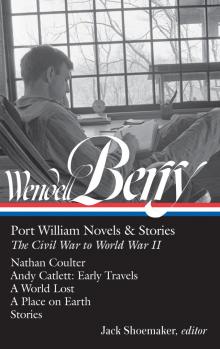 The Selected Poems of Wendell Berry
The Selected Poems of Wendell Berry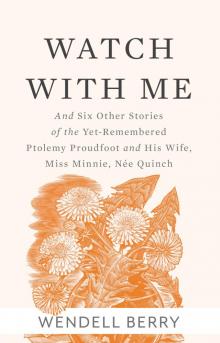 Watch With Me
Watch With Me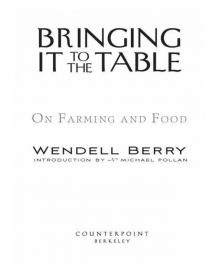 Bringing It to the Table: On Farming and Food
Bringing It to the Table: On Farming and Food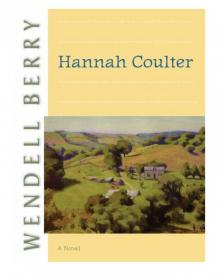 Hannah Coulter
Hannah Coulter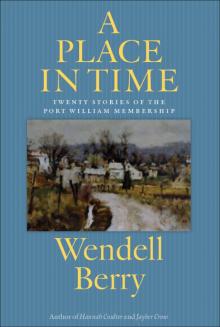 A Place in Time: Twenty Stories of the Port William Membership
A Place in Time: Twenty Stories of the Port William Membership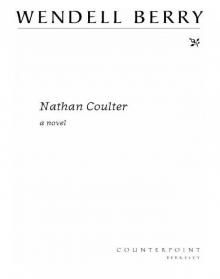 Nathan Coulter
Nathan Coulter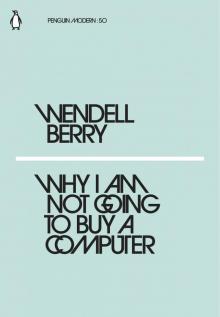 Why I Am Not Going to Buy a Computer
Why I Am Not Going to Buy a Computer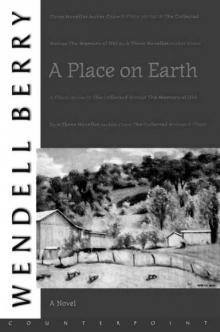 A Place on Earth
A Place on Earth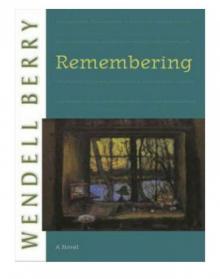 Remembering
Remembering New Collected Poems
New Collected Poems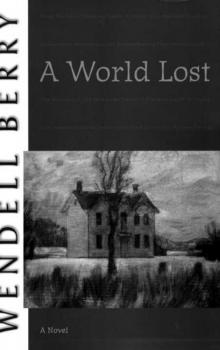 A World Lost
A World Lost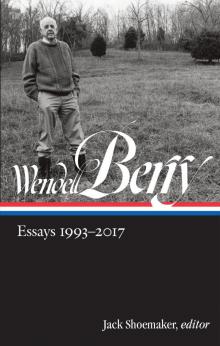 Wendell Berry
Wendell Berry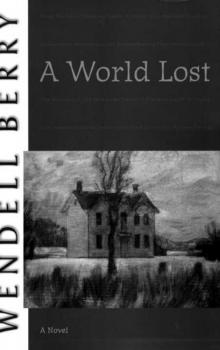 A World Lost: A Novel (Port William)
A World Lost: A Novel (Port William)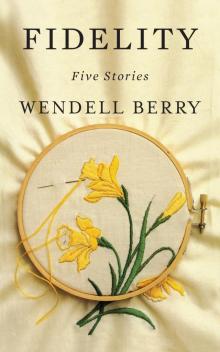 Fidelity
Fidelity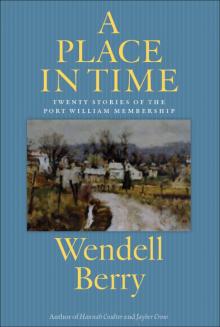 A Place in Time
A Place in Time